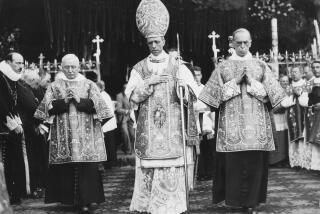Ex-Hostage Remembers Companion : Jenco Shares Letter to Lebanon at L.A. Event
- Share via
Lawrence Martin Jenco, a former hostage in Lebanon, wrote a letter to a cherished friend last week that he knows will not be delivered.
It was written to Terry A. Anderson to observe an ugly anniversary. Two years ago today, Anderson, Associated Press Middle East chief correspondent, was kidnaped by armed men who pushed him into a green Mercedes-Benz that disappeared down a Beirut street. The 39-year-old has been imprisoned longer than any of the other eight Americans still held hostage in Lebanon.
On Sunday morning, Father Jenco shared the letter with 250 worshipers, wearing yellow ribbons, who had gathered at First Baptist Church in the Wilshire district to participate in a “National Day of Prayer for the Hostages” sponsored by Baptist congregations.
In the letter, Jenco recalled moments he shared with Anderson and expressed hope that the ordeal would soon be over for all the hostages.
“There are so many things I want to talk to you about,” the soft-spoken Catholic priest wrote. “Although I am free I frequently find myself in the same room with you. I am sure I told you that when I was in the closed closet, just knowing you were outside my door gave me comfort.
“Living with you for a year, in a very strange way, was a blessing,” continued Jenco, who noted that he has become a compulsive radio listener in hopes that he will hear good news from the Middle East.
Jenco’s letter was prompted by a call from the Associated Press, which wanted to observe the anniversary of Anderson’s kidnaping. The AP asked Jenco and two other former American hostages, the Rev. Benjamin Weir and David P. Jacobsen, to write about their former companion. Jenco’s was the only one in letter form.
Jacobsen wrote an article that recalled that he and Anderson were cell mates for 16 months. When they first met in a chilly room lit by a green, 25-watt light bulb, they stretched as far as they could in their shackles so they could shake hands.
While their political, economic and social philosophies were different, a bond was struck. To kill time, the two played chess with pieces made from foil wrappers and played hearts with a homemade deck of cards. Jacobsen said he had never met anyone better read or more articulate.
Jacobsen recalled that Anderson, the father of two girls, was “frustrated that the American public really wasn’t listening to what he was reporting. He wanted America to be informed as to the symptoms and the causes of terrorism.
“He risked his life to inform you,” Jacobsen said. “Were you listening? Did you care?”
Weir recalled Anderson as an energetic, spirited man who found confinement difficult after a whirlwind life as a foreign correspondent and a Marine in Vietnam. To keep busy, Anderson exercised more than the rest and began learning Arabic.
“I remember Terry not only for what he did, but for the creative, insightful, adventurous, caring companion he was,” Weir wrote.
When the church service ended Sunday, Jenco largely declined to answer questions about political aspects of the hostage situation.
Jenco discounted a suggestion that the Iran- contra scandal, which has racked the Reagan Administration, has hindered the remaining hostages’ chances for freedom.
“I have a suspicion there is a process they are following in releasing these men,” he said. “I don’t think it makes a difference.”
He condemned the Reagan Administration’s past policy of trading arms to Iran in exchange for hostages.
“I think I’ve mentioned a thousand times I don’t agree with that,” said Jenco, who now lives in Buena Park.
After hundreds of handshakes, hugs and good words from the congregation, Jenco stood on the steps of the church and wondered aloud about the value of his letter and the other letters that have never reached the hiding places of the American hostages.
“You wonder if they have any benefit,” he said quietly.
More to Read
Sign up for Essential California
The most important California stories and recommendations in your inbox every morning.
You may occasionally receive promotional content from the Los Angeles Times.












